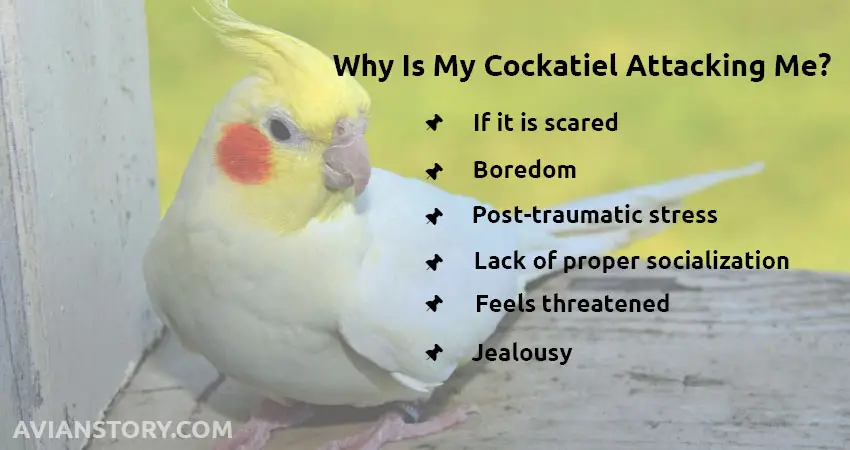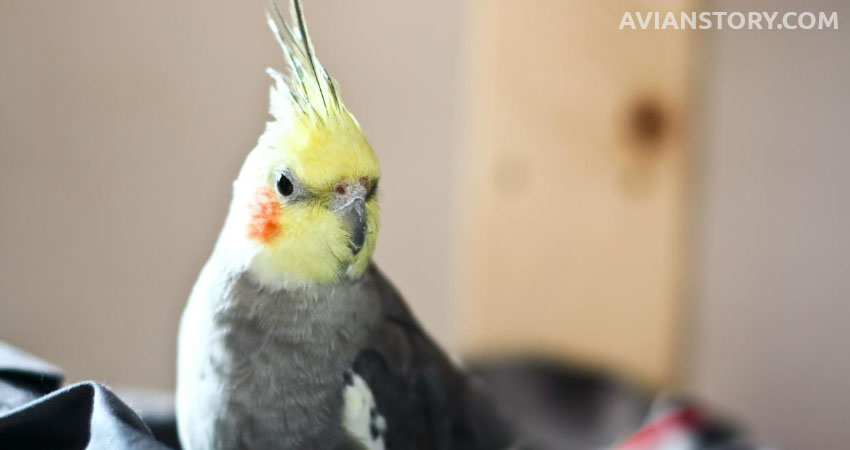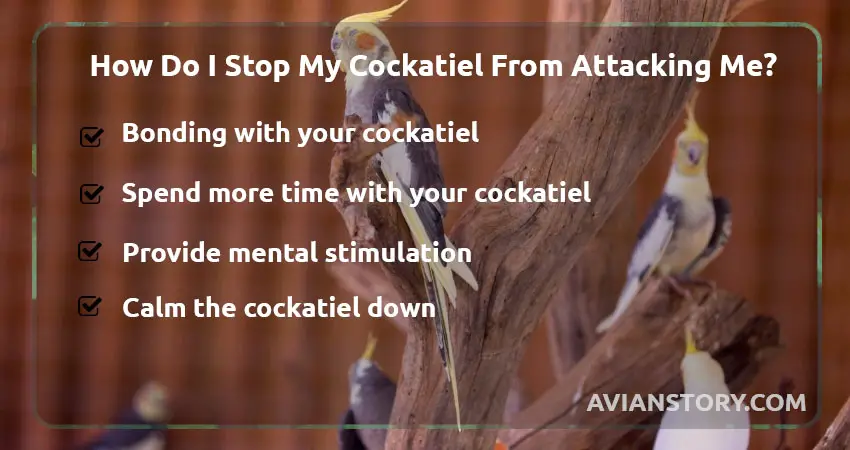Why Is My Cockatiel Attacking Me?-What Should I Do?
Cockatiels are naturally not mean birds. They are very friendly; however, these small feathered companions can sometimes attack you. Your responsibility as a cockatiel parent is to determine what triggers the aggressive behavior.
So, why is my cockatiel attacking me? Cockatiels attack their owners when they feel threatened or try to be defensive. They will feel threatened when you change something in their vicinity, or a stranger comes into your home. Your cockatiel will either lash at you or bite you.
Also, if your cockatiel is bored or lonely, it may become aggressive. Hormones may have fueled the attacks if it is not attacking you all the time. This article will discuss why your cockatiel is attacking you, signs of aggression in cockatiels, and how to stop your cockatiel from attacking you.
Why Is My Cockatiel Attacking Me?

Your cockatiel may be attacking you due to the following reasons.
● If it is scared
When a cockatiel is terrified of you, it will act violently to appear more frightening. Fear can be caused by being in a new place, post-traumatic stress disorder, or the threat of being in the presence of a predator.
If you have just brought the cockatiel home, it can be terrified of its new surroundings. In this case, allow your cockatiel some time to acclimate to its new surroundings before petting it again. Be patient because it could take a while.
Your cockatiel may be scared due to loud noises or the introduction of a new pet. The best method to tackle such a case is to minimize your cockatiel’s involvement with the new pet or person, gradually acclimating them to their presence. Also, provide the cockatiel with a quieter environment.
● Boredom
Cockatiels will bite to indicate that they need to play or be entertained. This often happens when it has tried to get your attention differently, but you have disregarded it.
Cockatiels are intelligent birds that can become snappy and aggressive if they are not stimulated mentally. They require something to excite their intellect, such as a toy.
Boredom manifests as aggression in the cockatiel. As a result, you should provide your cockatiel with various toys and puzzles to focus on and play with.
● Post-traumatic stress
If the cockatiel was mistreated in its prior home, it might be aggressive towards you and everyone else. In this scenario, make sure your cockatiel has a quiet and comfortable environment to live in.
Perhaps your cockatiel has not been adequately socialized. It will turn to bite, especially if it has previously gotten a positive reaction from you. If you tried to reprimand it for this behavior, you might have used a friendly tone, which confused your cockatiel.
When teasing, cockatiels commonly nip and nibble at one another, and they generally do so playfully and with no malice. A hard bite can be painful. The cockatiel might not have learned the difference between a light nibble and a hard bite if it was not adequately socialized when it was young.
During playfulness, a cockatiel may become overly excited and bite hard. It is not aggressive behavior if it bites you while playing. You will notice that cockatiels bite each other as a way of grooming one another. The biting process is also called allogrooming. So, biting is not always malicious.
● Feels threatened
Birds can sense a person’s aura. Therefore they can tell when you’re upset. So when you approach your cockatiel aggressively, it will get scared, thus being aggressive. Also, if there is a lot of traffic outside the window where your cockatiel’s cage is, it can be stressful for them.
The cockatiel will presume that there are predators and will want to defend itself because it cannot flee. As a result, if you put your hand inside the cockatiel’s cage, it will bite defensively.
● Jealousy
Cockatiels become envious when you stop spending time with them. If you pay more attention to a new pet or person, your cockatiel may be upset with you.
What Are The Signs Of Aggression In Cocktiels

The most common signs of aggression in cockatiels are;
- Wing flapping: occurs when a bird makes a symbolic gesture with its wings and moves them up and down. It is usually an indication of anger or irritation. If you’ve been bugging him, try to leave it alone for a while.
- Hissing: is associated with violent actions such as lunging. If your cockatiel hisses, it may be about to bite you.
- Snapping: if they are going to bite you, cockatiels will rush at you. They may even snap their beak in your direction. You should give it space if it is trying to snap at you.
- Dilated pupils: if the cockatiel’s eyes widen suddenly, it could mean it is angry. If you notice this warning indicator, stop what you’re doing.
- Watch out for ruffled head and tail feathers: when the cockatiel gets aggressive, it may put its head down. It can also fan its tail feathers and ruffle its feathers. If it starts walking toward you in this position, get out.
- Flipping upside down: combined with outstretched wings, this position usually indicates that it is attempting to defend its territory.
How Do I Stop My Cockatiel From Attacking Me?

Cockatiels’ bites can be hazardous. According to research, bird bites result in more infections than other bites. Here are some ways to prevent cockatiels from attacking you:
● Bonding with your cockatiel
If your cockatiel is new to your home, it will likely bite out of fear. Cockatiels are friendly birds, but when they are agitated, they can become aggressive. Allow some time for your new cockatiel to acclimate to its new environment.
During this time, strive to establish a cordial relationship with it. Do not linger around its cage. Eat in the same room with it or hand feed it so it can get used to your scent.
A weird hand approach can also result in biting. This is especially true if you enter the cockatiel’s cage, invading its domain. To defend itself, it may bite you. Do not approach the cockatiel’s cage from above.
● Spend more time with your cockatiel
If you have not been spending time with your cockatiel, it may bite you because it may perhaps know that biting will make you respond to it. It may be biting you to get your attention.
Giving your cockatiel more attention is the best way to resolve this type of biting. If it bites you, correct it firmly, but once it’s been disciplined with a time-out, give it your full attention. Ensure the time-out is long enough, so your bird doesn’t feel rewarded for biting.
● Provide mental stimulation
Provide your cockatiel with toys to focus on. It will bite its toys rather than bite you. Especially for young cockatiels, give them a chew toy after biting you and frown at it.
This gesture will help it see that biting is wrong. Also, if your cockatiel is distressed or scared, a toy will help it diverge its attention from worrying. You can also add another cockatiel to be your cockatiel’s companion.
● Calm the cockatiel down
If you have made any new changes, e.g., a new pet or person, relocated its cage or altered something about yourself. Try calming your cockatiel down before introducing the changes. You can play calm classical music, cover its cage so it can wind down, and speak softly to it.
You can also try handling your cockatiel more when no new faces are around. Once the cockatiel is calm and docile, gently introduce it to the new pet or human so that it becomes used to the notion.
When your cockatiel is aggressive, avoid handling or playing with it. Never force a bird to play with you since it will become frustrating and will not relieve the anxiety that causes biting.
Related Questions
Here are other related questions.
What do I do if my cockatiel attacks me?
Do not yell at the cockatiel. Also, do not reward the cockatiel or stroke your cockatiel after it attacks you. If you shout at a cockatiel, it might get spooked and bite you again.
How do I train my cockatiel to stop attacking you?
Teach your cockatiel to know when you say no. Give it a time-out whenever it bites you. React calmly, withdraw your hand and leave the room. Once the cockatiel has learned that if it bites, it loses playing privileges, it will stop biting you. Ensure you clean the bite mark to prevent infections.
Conclusion
Why is my cockatiel attacking me? If your budgie bites you, identify what makes it react this way. If it is fear, ensure you provide a calm and quiet environment for your cockatiel. If it is due to attention, spend more time with your cockatiel.
In case it bites you, do not yell all shout. Just remain calm and avoid your cockatiel for some time. Train it to stop biting, and eventually, it will learn. We hope this article provides you with the answers you need.
